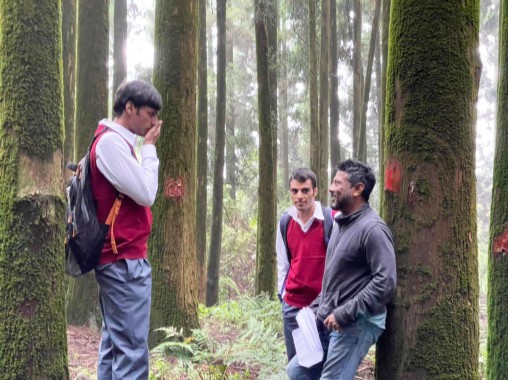




















Sunday, Jun 05, 2022 08:00 [IST]
Last Update: Sunday, Jun 05, 2022 02:29 [IST]
A SE LONG READ
GANGTOK,: National award-winning filmmaker Onir (born Anirban Dhar) is currently in Sikkim for a five-day shoot for a Hindi-language feature film ‘Pine Cone’, the first-of-its-kind Hindi mainstream film with a queer character to lead his LGBTQiA story.
“Pine Cone started off because I was angry and frustrated about what happened with ‘We Are’, and the Ministry of Defence refusing to give me no-objection certificate (NOC) to shoot and exhibit the work,” expressed Onir in a conversation with SIKKIM EXPRESS.
The filmmaker was all set to make his upcoming anthology ‘We Are’, a sequel to his acclaimed anthology film ‘I Am’ (2011), and was to tell queer stories from across India.
“One of the stories was based on a real-life story about a gay army man. The story is in public domain and I was inspired to tell his story, of course, with his permission. The Ministry of Defence refused to give me NOC, but I was adamant that cannot stop telling stories about the queer community and I need to keep telling stories the way my community wants to. I decided to write ‘Pine Cone’, earlier this year. As I was so angry, I wrote the script in a span of 15 days,” said Pine Cone director, producer and writer Onir.
Pine Cone is a story about an out-and-proud gay man, how he navigates life through three decades i.e. 18, 28 and 38 years. Pine Cone is a queer narrative which is not seeking acceptance or approval from the heteronormative world.
“The character does not care about acceptance. He celebrates his life! As a filmmaker and an out-and-proud gay person myself, believe that I don’t care if someone accepts me or not. It is their blindness if they can’t accept me. I celebrate my life anyway and I always have. I never went through emotional turmoil about my acceptance. All the other stories in mainstream films are about acceptance and rejection, whereas ‘Pine Cone’ is about three different love stories a person encounters in three different phases of his life,” informed the filmmaker.
With a screentime of about 100 minutes, the film has been shot in Sikkim, Mumbai and Kochi. The shoot in Mumbai and Kochi has already concluded and Sikkim is the last location. The shoot locations in Sikkim are Tsomgo Lake, Yakten, Rumtek and different parts of Gangtok.
Sikkim-lad and The Voice of Sikkim editor Nitesh Pradhan has debuted as the line producer in Sikkim for ‘Pine Cone’.
“I wanted to shoot the first part, where my lead is 18-years-old in Sikkim because I spent my early years in Bhutan, where I was born. Bhutan and Sikkim have somewhat similar cultures. Also, Nitesh, who I have known for the past 10 years, convinced me to shoot my film in Sikkim. Making films is also about relationships with people and I wanted to come and discover Sikkim. My sister has been to Sikkim and she too strongly recommended I come and shoot here. It was also an impulsive decision, like it was a calling. Fifteen days before the ‘Pine Cone’ shoot began, I was in the IPL bubble, shooting a documentary. I quit in the middle of it and stated that I was going to shoot my film. The second part is in Mumbai and the final part is in Kochi. The film has been shot in three locations i.e. Sikkim, Mumbai and Kochi, each destination with its own unique landscapes. Sikkim is mountains, Kochi is the sea and Mumbai is all about night and small closed spaces, like in a big city”.
The film introduces five debutant actors, with Vidur Sethi as the main lead. He is the first gay actor to be introduced in the lead role in a mainstream Hindi film.
“The film has only five characters, so unfortunately we could not take anyone from Sikkim. I got in touch with Nitesh earlier to know if I could cast someone from Sikkim but it was difficult to get someone to portray a gay role. It was not just about someone who is willing but he has to be a good actor too. There are two characters ‘Sid’ and ‘Derek’, and I wanted someone from Sikkim to play ‘Derek’. I tried but that just didn’t happen,” he expressed.
Sikkim, the ‘Most Film Friendly State’
Onir: Sikkim bagged the ‘Most Film Friendly State’ award last year. Now that I have been in Sikkim to shoot my film, I think the tag has been given without much understanding. As there is no proper film industry here, the struggle to get permission is haywire and you have to go to 10 different places. There should be a single-window clearance, which makes it easier.
When I saw the brochure, there were so many beautiful places that people from outside Sikkim can see and films are the best way to show such places. But again, you have to get permission from so many different departments and the army. It is a long process and I think it is unfair for filmmakers. There is time to simplify the process.
Of course, I know Sikkim is a sensitive area close to the borders but unless someone is shooting near the borders or even better just have an observer, and make the production house pay for the observer.
The most important thing is to develop a studio in Sikkim, with proper equipment and filmmaking workshops should be conducted here too. This is basically so that locals get trained and empowered to become part of the crew. When I call the driver, asking him to pick me up at 5 am, he will reach around 7 am. Time is an essence, especially for a place like Sikkim where the weather is so unpredictable. Lighting is important for films and they don’t seem to understand it. It is terrible not to be on time and coming from Bombay, people usually come before time. That culture has to develop in Sikkim too. It is not the locals’ fault, it is just because they don’t understand. Workshops should be conducted for people like drivers, spot boys who are involved in films, directly or indirectly.
Films provide employment and tourism. It is important that people are empowered. It is the small things that people should learn.
Will you be coming back to Sikkim for your next film?
Onir: I would definitely come back to Sikkim for another film. I feel happy, just to be able to talk in Nepali and I am a foodie. Here, I can eat momo, thukpa and Nepali thali for breakfast, lunch and dinner. I am enjoying every bit of it. I want to come here and explore too.
The next time I come to Sikkim for my film, I want to use Nepali in my film.
Working with Geetanjali Thapa
Onir: I have worked with Gitanjali, Sikkim’s only national award-winning actor in ‘Kuch Bheege Alfaz’, and I have to say that she is amazing. She is one of the most beautiful and amazing souls. She was that one person I could talk in Nepali on set.
What next?
Onir: Immediately after ‘Pine Cone’, I want to start ‘We Are’. I can’t say how I will make it happen but I am stubborn and I have some tricks up my sleeve. I will make ‘We Are’ happen. I have already thought about how I will do it. (laughs!)
I am going to Kashmir for recce after Sikkim. It is the same place where I was supposed to shoot earlier. I am also starting a web series for Sony Liv. It is a big series that I am working on.
Choosing sensitive topics
Onir: I want to tell stories that can touch other people’s hearts. I want to create cinema that stays back, rather than have a life of week at the box office and be forgotten forever. ‘My Brother… Nikhil’ is my first film and it is close to my heart. Until you make your first film, it is your dream and with ‘My Brother… Nikhil’, the dream came true.
‘Pine Cone’ is scheduled to be released early next year. Onir plans on taking the films to film festivals and later have a small premiere in Mumbai. As it is a niche film, it would then be released on OTT platforms.
Onir is best known for his debut film ‘My Brother… Nikhil’ (2005), one of the first mainstream Hindi films to deal with AIDS and same-sex relationships based on the life of Dominic d’Souza, starring Sanjay Suri, Purab Kohli and Juhi Chawla. He won the National Award for his film ‘I Am’ and has a total 16 film awards in his name.
Onir was born to Aparesh Dhar and Manjushree in Samchi, Bhutan.
